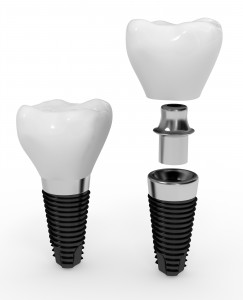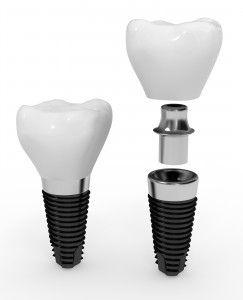Pediatric Sealants and Fluoride
July 2, 2014
 Until your child learns how to brush efficiently, he or she may be more prone to developing cavities. Thankfully, there are preventive services that can help young patients protect their teeth. And at Dr. Banda’s office in Bloomfield Hills, we’re happy to offer them at regular checkups and dental cleanings.
Until your child learns how to brush efficiently, he or she may be more prone to developing cavities. Thankfully, there are preventive services that can help young patients protect their teeth. And at Dr. Banda’s office in Bloomfield Hills, we’re happy to offer them at regular checkups and dental cleanings.
The specific services we’re talking about are dental sealants and fluoride treatments. And in today’s post, we want to talk briefly about what each one involves and how it helps.
Dental Sealants
Dental sealants protect the chewing surfaces of teeth, especially where there are deep pits or grooves where bacteria and food particles can hide. Sealants are applied as a liquid and then dried until they form a thin plastic layer directly protecting teeth from food or decay-causing bacteria. The entire process only takes about 10 to 45 minutes, depending on how many teeth we’ll be sealing. Once complete, results can last for as long as 10 years.
Fluoride Treatments
Fluoride helps teeth by attracting the minerals that strength tooth enamel. A fluoride treatment at our Bloomfield Hills office requires just one quick rinse. In addition to receiving fluoride treatments from us, make sure that your little one is also brushing with a fluoride toothpaste. What’s more, most water supplies in the US contain fluoride. Adding a fluoride mouthwash to your child’s regular brushing and flossing routine will also help your little one enjoy good oral health.
Do you have questions about these services, or do you need to schedule an appointment with Dr. Banda? Call us today. We serve patients from Clarkston, Troy, Royal Oak, Birmingham, and the entire metropolitan Detroit area.
Treating Bruxism with Customized Nightguards
June 19, 2014
 If you’ve never heard of bruxism, your immediate question might be, “What is bruxism?” In today’s post, we want to talk about what exactly this condition is, what causes it, and how Dr. Banda of Cranbrook Dental Care can help you treat it.
If you’ve never heard of bruxism, your immediate question might be, “What is bruxism?” In today’s post, we want to talk about what exactly this condition is, what causes it, and how Dr. Banda of Cranbrook Dental Care can help you treat it.
What Is Bruxism and What Causes It?
To put it simply, bruxism is a term that describes a recurring and unconscious struggle with teeth grinding. For many patients with bruxism, it’s caused by stress. What’s more, patients have the most trouble with it while sleeping, when it’s impossible to consciously stop grinding.
Symptoms of bruxism include headaches, earaches, and jaw pain. Other causes of bruxism, besides stress, include misaligned teeth, or a poor posture, poor diet, or poor sleep habits. Patients with bruxism may also display other kinds of biting habits. They may bite their fingernails, for instance, or they might bite the ends of pencils, their lips, or the insides of their cheeks. The condition affects roughly one-third of the population, and it’s more prevalent in women than men.
Over time, the constant pressure and motion associated with bruxism can seriously damage teeth. Bruxism can also contribute to TMJ dysfunction, which has many symptoms in common.
Customized Care for Teeth Grinding
Thankfully, treatment for teeth grinding is possible with a custom-made nightguard from Dr. Banda’s Bloomfield Hills dental office. During a consultation, we’ll evaluate your teeth, tissues, and muscles. Once we know what your needs are, Dr. Banda can help you understand how a nightguard will help you. We can also talk to you about other treatment techniques.
Do need help treating bruxism? Call Cranbrook Dental Care today for an appointment with Dr. Banda. We serve patients from Clarkston, Troy, Royal Oak, Birmingham, and the entire metropolitan Detroit area.
Are Your Brushing Correctly?
May 23, 2014
 Brushing and flossing are two of the most important daily activities you can do. With regular brushing and flossing, you can remove bacteria and plaque from your teeth and your gumline, protecting it from common oral health issues like tooth decay and gum disease. What’s more, because studies have linked gum disease with health problems in other parts of the body, caring for your smile is another way of caring for your overall health.
Brushing and flossing are two of the most important daily activities you can do. With regular brushing and flossing, you can remove bacteria and plaque from your teeth and your gumline, protecting it from common oral health issues like tooth decay and gum disease. What’s more, because studies have linked gum disease with health problems in other parts of the body, caring for your smile is another way of caring for your overall health.
So, now that you know how important brushing and flossing are, ask yourself: Are you brushing and flossing correctly?
To give your smile the help it needs, you should brush for about 120 seconds, or two minutes. You should also be sure that you’re dividing your time equally between not only your upper and lower teeth but also the inner surfaces and outer surfaces of your teeth. Hold your brush at about a 45 degree angle and apply gentle pressure as your scrub. To prevent bad breath, gently brush the surface of your tongue.
As for frequency, we recommend brushing at least twice a day, but it’s even better if you can do it after every meal. You should also floss at least once a day to get any leftover pieces of food away from your smile. And for extra protection from gum disease and tooth decay, we recommend using either an antibacterial or fluoride mouthwash.
Do you still have questions about how to brush and floss correctly? Don’t hesitate to call Dr. Banda’s office in Bloomfield Hills with your questions or to schedule an appointment. We serve patients from Clarkston, Troy, Royal Oak, Birmingham, and the entire metropolitan Detroit area.
Treating Sleep Apnea and Snoring with an Oral Appliance
April 24, 2014
 When you don’t get enough sleep at night, you can feel tired, stressed out, and moody the next day. If you feel this way often enough, you may see declines in your overall health and wellbeing.
When you don’t get enough sleep at night, you can feel tired, stressed out, and moody the next day. If you feel this way often enough, you may see declines in your overall health and wellbeing.
For some, there’s an easy fix to these symptoms. Maybe you just need to go bed earlier and at a more consistent time each night. In other cases, though, the fix may involve the diagnosis and treatment of a common but under-diagnosed condition known as sleep apnea.
Patients who struggle with sleep apnea stop breathing for 10 seconds or more throughout the night. As a result, the brain to send out a signal waking the patient up to take a breath.
Not every patient wakes up completely, though, which is why some patients don’t even know they are struggling with it. If you haven’t been diagnosed with sleep apnea but think you’re struggling with it, here’s a symptom to watch out for: snoring.
Often, the cause of a patient’s snoring and the cause of a patient’s sleep apnea go back to the same thing: obstruction from the tongue or lower jaw. Thankfully, there’s treatment for both at Dr. Banda’s office in Bloomfield Hills. A custom-made oral appliance from Cranbrook Dental Care will reposition your tongue and lower jaw while you sleep so that air passes through without anything stopping it. As a result, you can sleep better at night, and without snoring.
Are you worried that you might be struggling with sleep apnea? Call Cranbrook Dental Care in Bloomfield Hills to find out how Dr. Banda can help. We’re happy to offer care for sleep apnea and snoring to patients from Clarkston, Troy, Royal Oak, Birmingham, and the entire metropolitan Detroit area.
Protect Yourself from the Hidden Dangers of Periodontal Disease with Dr. Banda
January 29, 2014
 When you think about periodontal disease, what’s the first thing that comes to mind? Perhaps the thought of gum disease evokes images of receding gums or bleeding when you brush your teeth, or even eventual tooth loss if the condition progresses. Did you know, though, that untreated periodontal disease can actually affect your health in other ways? At Cranbrook Dental Care in Bloomfield Hills, MI, Dr. David Banda and his team provide comprehensive periodontal therapy to patients with gum disease to stop the condition in its tracks.
When you think about periodontal disease, what’s the first thing that comes to mind? Perhaps the thought of gum disease evokes images of receding gums or bleeding when you brush your teeth, or even eventual tooth loss if the condition progresses. Did you know, though, that untreated periodontal disease can actually affect your health in other ways? At Cranbrook Dental Care in Bloomfield Hills, MI, Dr. David Banda and his team provide comprehensive periodontal therapy to patients with gum disease to stop the condition in its tracks.
Periodontal Disease: The Systemic Link
In addition to contributing to major oral health problems, periodontal disease has been linked to a number of other, potentially more serious, complications. When the bacteria that accumulates in your mouth as a result of gum disease leaches into the blood stream, it can spread to organs and tissues throughout the body. Though research continues to delve into this systemic connection, the following have already been found to be consequences of untreated periodontal disease:
- Increased risk of coronary artery disease, heart attack and stroke
- Pulmonary hypertension
- Preterm birth and low birth weight infants
- High blood pressure
- Higher risk of pancreatic cancer
- Gastrointestinal disorders
- Rheumatoid arthritis
For the majority of patients, prompt periodontal therapy can substantially reduce the risk of developing these and other serious health problems.
Healthy Mouth, Healthy Body
If you’ve noticed the common symptoms of periodontal disease – bleeding gums, sensitivity, gum recession or chronic bad breath – it’s important that you address the problem before it becomes worse. Contact our office in Bloomfield Hills, MI today and schedule your consultation with Dr. Banda. We also gladly serve patients in Clarkston, Troy, Birmingham, Royal Oak and surrounding communities within the entire Detroit area. We look forward to helping you achieve optimal oral health and overall wellness!
Have You Thought of Any Smile Goals for 2014?
December 31, 2013
 A brand new year is just hours away. If you’re like most people, you might already have some goals mapped out for 2014. Maybe you want to eat better, or you want to improve your financial situation. But what about your smile? Have you considered what kind of goals you might have for it?
A brand new year is just hours away. If you’re like most people, you might already have some goals mapped out for 2014. Maybe you want to eat better, or you want to improve your financial situation. But what about your smile? Have you considered what kind of goals you might have for it?
Thinking ahead like this can be beneficial, especially if you’re on a limited budget or you know you’re in for a busy year. Working with Dr. Banda of Cranbrook Dental Care, you’ll be able to see the upcoming year with greater clarity. Not only can you make better plans, but you can face the year with a better sense of confidence.
For many patients, the primary goal will be a more attractive smile. This can be achieved with any of our cosmetic dental services, which include:
- Porcelain Veneers
- Invisalign
- Teeth Whitening
- Teeth Whitening
- Smile Makeovers
For other patients, restorative dental care might be the primary focus. With a selection of services that includes fillings, crowns, root canals and dentures, we’re confident we can improve not just the appearance of your smile but it’s functionality as well.
Still other patients will want to make regular visits a priority. We recommend that our patients from Bloomfield Hills and beyond come to see Dr. Banda twice a year for a regular exam and dental cleaning. Seeing Dr. Banda at least twice in a 12-month period will allow him to look for common conditions, like tooth decay and gum disease. Treatment for any condition should be administered as soon as possible—a goal that regular care makes possible.
Are you ready to schedule your first 2014 appointment with Dr. Banda? Call us to set up an appointment. We serve patients from Bloomfield Hills, Troy, Clarkston, Royal Oak, Birmingham, and the entire metropolitan Detroit area.
Become a Candidate for Dental Implants with Bone Grafting
July 31, 2013
 For some patients, dental implants are the perfect restorative option. Not every patient is automatically right for a procedure that involves dental implants, though. To support dental implants, you need to have enough bone density.
For some patients, dental implants are the perfect restorative option. Not every patient is automatically right for a procedure that involves dental implants, though. To support dental implants, you need to have enough bone density.
Patients who have had missing teeth for years, or who have had conventional braces for years, may find that they need help with bone grafting before they can seriously be considered for dental implants. That’s because, over time and in the absence of one or more tooth roots, bone loss will occur. What a bone graft is designed to do is restore lost tissue so that a patient who wants dental implants can become a candidate for them.
Dr. David Banda has years of experience providing all phases of dental care, including surgical. That means that, when you come to Cranbrook Dental Care to learn more about bone grafting, you’ll find a knowledgeable, experienced doctor eager to help you. With a thorough exam, he can help you determine if implants are right for you and if bone grafting would help. The treatment plan Dr. Banda creates will be completely customized to fit your needs.
Do you want to learn more about bone grafting and dental implants? Call Cranbrook Dental Care today with your questions or to schedule an appointment. Dr. Banda and his team are proud to offer all phases of dental implant care to patients of Bloomfield, Bloomfield Hills, Troy, Birmingham, Clarkston, Royal Oak, and the entire metropolitan Detroit area.
What Is Restorative Dentistry?
July 3, 2013
 Restorative dentistry is a branch of care that lets dentists repair decayed or damaged teeth so that patients can return to optimal oral health. Every patient, at some point, will need restorative help, even those who brush, floss, and see their dentist twice a year for checkups.
Restorative dentistry is a branch of care that lets dentists repair decayed or damaged teeth so that patients can return to optimal oral health. Every patient, at some point, will need restorative help, even those who brush, floss, and see their dentist twice a year for checkups.
Today’s most effective, and most common, restorative dentistry services include:
Not every restorative service is right for every patient, though. Restorative dentistry is highly personal. That means that when you come to Cranbrook Dental Care for restorative help, Dr. Banda will strive to offer you the most customized care he possibly can.
Every restorative procedure begins with a consultation appointment. During your consultation, your doctor will assess your needs and then recommend a service or multiple services based on the results of that exam. Your consultation will also be a time when you can ask questions about the plan we put forward. Knowing what to expect from restorative dental care is one step in easing anxiety about your procedure.
Do you need care with restorative dentistry? Call Cranbrook Dental Care to schedule an appointment with Dr. Banda. Our office is located in Bloomfield Hills and serves Troy, Birmingham, Franklin, and the entire metropolitan Detroit area. We look forward to helping you.
Long-Term Teeth Replacement for Bloomfield Hills
May 24, 2013
 Is your smile full and healthy, or do you have missing teeth that are keeping you from a lifetime of confidence and good function. At Cranbrook Dental Care in Bloomfield Hills, Dr. Banda offers long-term teeth replacement with dental implants, one of the most effective restorative services available today.
Is your smile full and healthy, or do you have missing teeth that are keeping you from a lifetime of confidence and good function. At Cranbrook Dental Care in Bloomfield Hills, Dr. Banda offers long-term teeth replacement with dental implants, one of the most effective restorative services available today.
Conventional bridges and dentures can restore some amount of functionality, but they don’t mimic nature’s design. Dental implants do. They have a crown on top to replace your missing tooth, with a prosthetic root (also called an implant post) on the bottom that bonds with the jaw. With this structure, dental implants make it possible to restore the kind of strong, stable smile you once had.
Restoring a smile with dental implants is a two-phase process. In the first phase, Dr. Banda will place your implant(s) himself, using his more than 20 years of experience to guide him. Then, when your implant(s) has been placed, you’ll be given some time to heal. During this period, the implant(s), which is made from biocompatible titanium, will begin to fuse with the bone in your jaw. This is what creates the foundation for your new crown, bridge, partial, or full denture.
The second phase of your implant procedure is all about completing the work. Your custom-made restoration will be attached, completing your procedure. To have your new restoration attached, you’ll simply return to Dr. Banda’s Bloomfield Hills office. Then, with your smile fully restored, you can enjoy the good health and functionality you deserve.
But are dental implants the best long-term solution for you? Let Dr. Banda talk to you about your options. Call Cranbrook Dental Care today to reserve your consultation appointment. During your visit, Dr. Banda will talk to you about all your options and can answer any questions you might have.
Do you want to find a long-term tooth replacement option that works for you? We can help. Our Bloomfield Hills dental office serves Troy, Birmingham, Clarkston, Royal Oak, and the entire metropolitan Detroit area.
Benefits of Dental Implants
January 30, 2013
 A complete smile is important for more than one reason. Not only does a complete smile help you feel more confident around others, it’s important for speaking and for enjoying a healthy diet. When you’re unable to do those to the extent that you’d like you can feel self-conscious and even defensive.
A complete smile is important for more than one reason. Not only does a complete smile help you feel more confident around others, it’s important for speaking and for enjoying a healthy diet. When you’re unable to do those to the extent that you’d like you can feel self-conscious and even defensive.
But thankfully, there’s a restorative dentistry solution called dental implants that can help you restore your smile’s appearance and its functionality. With dental implants, Dr. Banda’s Bloomfield patients can enjoy a smile that looks and functions just like a natural smile.
How Do Dental Implants Work?
Like natural teeth, dental implants are made up of two parts: a crown and a “root.” But the root, in this case, is made of titanium and is surgically placed in the jaw. Because titanium is a biocompatible metal, the “root” will bond with the jaw over time, stimulating the growth of bone tissue until there’s a firm bond between the implant and the jaw.
Dental implants can be used in a variety of situations. Some patients may only need to replace a single missing tooth. Others may need to replace as much as a whole row. Dental implants are a versatile option that can work in a variety of situations.
Not every patient is a candidate for dental implants, though. To find out if dental implants are right for you, call Cranbrook Dental Care. Dr. Banda would be happy to advise you following a consultation appointment. We serve patients from Bloomfield, Troy, Birmingham, Clarkson, Royal Oak, and the entire metropolitan Detroit area.










